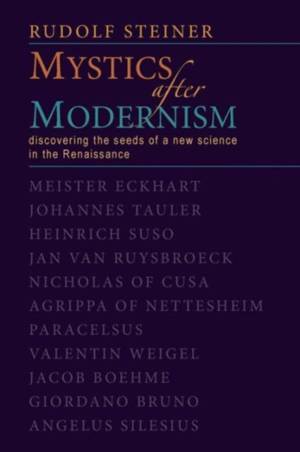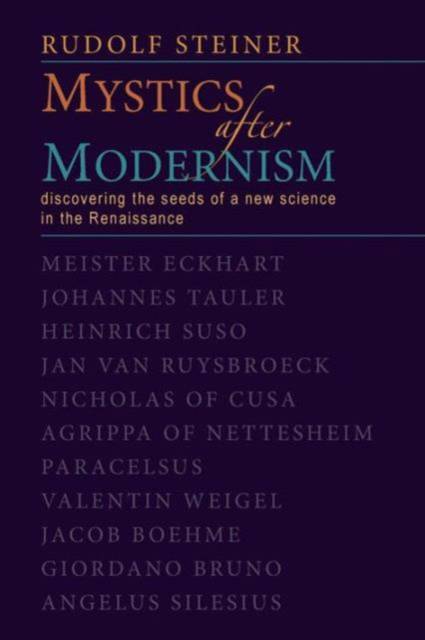
- Retrait gratuit dans votre magasin Club
- 7.000.000 titres dans notre catalogue
- Payer en toute sécurité
- Toujours un magasin près de chez vous
- Retrait gratuit dans votre magasin Club
- 7.000.000 titres dans notre catalogue
- Payer en toute sécurité
- Toujours un magasin près de chez vous
Mystics After Modernism
Discovering the Seeds of a New Science in the Renaissance (Cw 7)
Rudolf SteinerDescription
Written in 1901, based on lectures at the Theosophical Library, Berlin (CW 7)
"Natural science makes bread; the 'mystics' taught the way of cultivating their souls as a garden in which such seeds could sprout and reach their full potential. 'Mysticism' from this point of view is an inner process that can illuminate and transform--make transparent to their higher meaning--outer facts. The fragmented multiplicity of the 'dissected' world becomes thereby unified in meaning." -- Christopher Bamford (foreword)The mystics Steiner writes about in this book were early giants in the modern art of illumined self-knowledge. Their ways of seeing the world, God, and themselves foreshadowed all that we practice now in the best of meditation, both East and West. Here, you can read about their essential passion for unity, their practice of intensification of perception, and their ever-fresh insights into the process of knowing itself.
Steiner immerses us in the evolving stream of these eleven mystics who appeared in central Europe between the thirteenth and seventeenth centuries. They managed to resolve the conflict between inner perceptions and the new seeds of modern science and human individuality. Based on the lives of those mystics and on his own spiritual insight, Steiner shows how their ideas can illumine and preserve our true human nature today.
Rudolf Steiner ends his book with a quotation from the Cherubinic Wanderer, a collection of sayings gathered by Angelus Silesius: "Dear Friend, this is enough for now. If you wish to read more, go and become the writing and the essence yourself."
"The present book, Mystics after Modernism, is a fruit of Steiner's lecturing activity. The substance of it was contained in a series of lectures he gave in Berlin beginning just after Michaelmas in 1900 when he was thirty-nine. Steiner wrote later, 'By means of the ideas of the mystics from Meister Eckhart to Jacob Boehme, I found expression for the spiritual perceptions that, in reality, I decided to set forth. I then summarized the series of lectures in the book Mystics after Modernism.'" -- Paul Marshall Allen (afterword)Mystics after Modernism is a translation from German of Die Mystik im Aufgange des neuzeitlichen Geisteslebens und ihr Verhältnis zur modernen Weltanschauung (GA 7), Rudolf Steiner Verlag, Dornach, 1993. A previous edition was titled Mysticism at the dawn of the Modern Age.
Spécifications
Parties prenantes
- Auteur(s) :
- Editeur:
Contenu
- Nombre de pages :
- 208
- Langue:
- Anglais
- Collection :
Caractéristiques
- EAN:
- 9780880104708
- Date de parution :
- 01-09-00
- Format:
- Livre broché
- Format numérique:
- Trade paperback (VS)
- Dimensions :
- 153 mm x 236 mm
- Poids :
- 335 g







